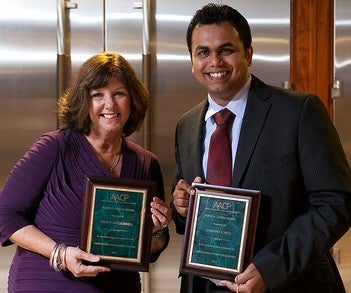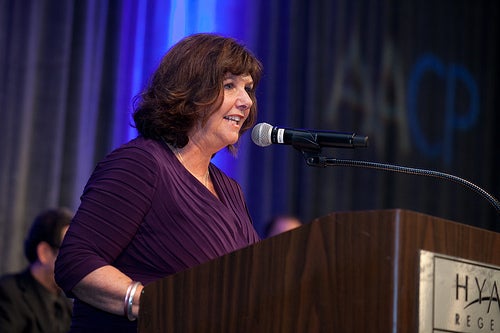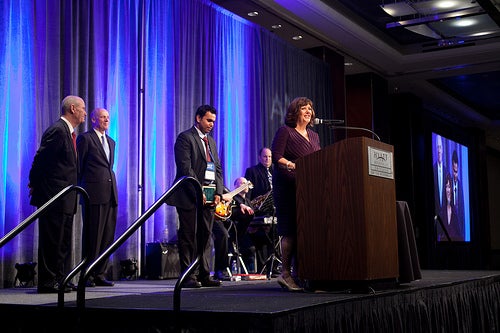Newport resident brings together health care students for team-based learning
KINGSTON, R.I. – April 2, 2013 – Ask Celia MacDonnell what her reaction was when she found out she had been honored for the best pharmaceutical publication in 2012, and her answer may surprise you. “I had no idea what the award even was,” she said, humbly. “I had no idea it was such a big deal.”
And a big deal it is: MacDonnell, clinical associate professor of pharmacy at the University of Rhode Island, has been honored with the Rufus A. Lyman Award, presented annually by the American Association of Colleges of Pharmacy for the year’s best publication involving original research and/or other scholarly work in the American Journal of Pharmaceutical Education. In 2012, 150 research articles were published, and 24 of those were selected to be finalists for the award; MacDonnell’s was chosen the winner.
“The journal is the gold standard for publications in pharmacy education,” MacDonnell explained. “So this really is quite an honor.”
Along with three of her colleagues and a graduate student, the Newport resident authored “An Introductory Interprofessional Exercise for Healthcare Students.” The article describes her research in how students from the pharmacy and nursing programs at URI and medical students from the Warren Alpert Medical School at Brown University work together to diagnose and treat patients.
“Our piece is a timely one,” MacDonnell said. “The emphasis right now is on group work and working in teams. The literature out there right now is rife with this subject.”
MacDonnell submitted the manuscript in March 2012. It was returned to her with comments for resubmission– one of them asking the group to rerun their data. “I collaborated with my T.A., who is working on his Ph.D in pharmacoepidemiology, to rerun the data – and it turned out even better than the first time that we ran it,” she said. “He is the second author on the piece.”
In total, there are five authors of the article, including MacDonnell. “They are an amazing group,” she said. “We each have our own schedules and obligations, so we completed much of the article online. It was a group effort.”
MacDonnell has pioneered the interprofessional education effort at URI. Before coming to the College of Pharmacy, she worked as a civilian clinical pharmacist at the Naval Hospital in Newport. “Their work has a strong team-based focus,” she said. During her time there, MacDonnell worked in the emergency room. “I worked with physicians and nurse practitioners, and I was always included in discussions regarding patients,” she said. “Sometimes there were differences of opinion, but you just sort of had to get over it and work together to treat the patient.”
When MacDonnell came to the URI College of Pharmacy, she began working on bringing the team-based approach to the curriculum. Armed with her idea, MacDonnell began implementing interprofessional education in the undergraduate health sciences programs at URI. She started collaborating with the College of Nursing in 2005. In 2007, MacDonnell approached Dr. Richard Dollase, director of Medical Education at Brown’s Alpert Medical School, about collaborating with Brown medical students. “He accepted my idea without hesitation,” she said.
Today, interprofessional education has become an integral part of the College of Pharmacy curriculum. “It is part of the laboratory curriculum, but it’s actually more of a practicum,” MacDonnell said. The program today consists of 300 students. Groups of third year doctor of pharmacy students, second year medical students, and senior nursing students are formed into teams. Each team meets with a “patient”, actually an actor trained in the disease that he or she is representing. A grading rubric tailored to the lab exercise is given to both the patient and College of Pharmacy faculty members, who observe and grade the students. “We want to evaluate how they act as a team,” MacDonnell said.
MacDonnell acknowledges that previously, medical providers worked autonomously. “Every medical professional has a different skill set. For example, nurses are the first ones to see the patient, and they notice things that doctors don’t necessarily see at first. You cannot expect medical professionals to have an ‘esprit de corps’ if they don’t know what other medical professionals do,” she said.
Forming the teams for the workshop was difficult at first. “Figuring out the correct level of education was so important. Everyone has to have the same level of knowledge for the teams to work and the students to be comfortable,” she said. Finding space for the lab was also a challenge. “Initially, we held it in the dining hall of the Pembroke Campus at Brown,” she said. “We just needed a big enough space to hold everyone!” Today, the lab is held in the new medical school facility at Brown. “For a state university and a private university to collaborate like this is really unusual,” MacDonnell said. “We’re unique in that way.”
The future is promising for interprofessional education at URI. Currently, the group is in talks with the URI physical therapy program to involve doctoral candidates in the curriculum. “We’ve also recently had graduate students in social work at Rhode Island College join the program,” MacDonnell said. “Social workers have an entirely different job than nurses, doctors, and pharmacists. For example, they’re the ones who make sure that the patient is going home to a safe environment. It adds a new dimension to the team.”

While her focus is on interprofessional education, MacDonnell’s interests are varied. She serves as the chair of the advisory board for URI’s Office of Admission, as well as on a medication management committee at South County Hospital. MacDonnell also recently worked on a “telemedicine” project with the University of North Carolina at Chapel Hill, where students in the pharmacy program at URI FaceTimed with pharmacists at UNC about infectious diseases and possible treatments. Named Project PETCO (and modeled after Project ECHO at the University of New Mexico), the focus was on communicating with pharmacists who see different factors for infectious diseases due to different locations. “It’s not a winner yet,” MacDonnell admits, “but it could be. I have to tweak it more. But that’s the nice thing about working in this environment – you can tweak things.”
MacDonnell earned both her bachelor of science and doctor of pharmacy degrees from URI.
Paul George and Richard Dollase, both of Brown University, Kara Misto of the URI College of Nursing, and Saumitra Rege, a graduate student studying pharmacoepidemeology, also contributed to the publication.
This release was written by Rachel Donilon, a URI Marketing and Communications intern and writing and rhetoric major.
Media Contact: Dave Lavallee, 401-874-5862


